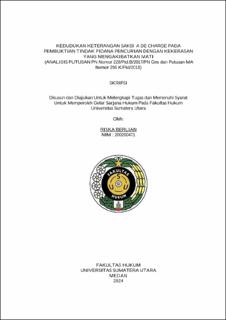| dc.description.abstract | The crime of theft with violence is one type of crime against property that causes a lot of losses. The impact of the crime of theft with violence or the threat of violence is causing injuries, both minor injuries and serious injuries to death. The problems raised in this thesis are: What is the difference between the crime of theft with violence resulting in death and the crime of murder? What is the position of witness A De Charge 's statement in proving the crime? How are the differences in the judge's considerations related to the testimony of witness A De Charge in proving the crime of theft with violence resulting in death in the District Court Decision Number 228 / Pid.B / 2017 / PN Gns and the Supreme Court Decision Number 295 K / Pid / 2018? The research method used in writing this thesis is normative legal research, namely research using secondary data which is primary, secondary and tertiary legal materials that examine positive law in Indonesia. From writing this thesis, the results obtained are that Article 365 of the Criminal Code regulates theft with violence, which includes violence or threats of violence to defend stolen goods or escape. The elements include the act of taking someone else's property (objective) and unlawful intent (subjective). The punishment varies, from nine years to the death penalty or life imprisonment, especially if there is serious injury, death, or the act is carried out by a group in a certain location. Witnesses provide testimony based on what they see, hear, or experience. Witness A De Charge is a witness presented by the defendant to reduce the sentence, as regulated in Article 116 of the Criminal Procedure Code. Law No. 31 of 2014 emphasizes legal protection for witnesses, including physical and mental protection. The credibility of Witness A De Charge in a criminal case based on PN Number 228 / Pid.B / 2017 / PN Gns, witness A De Charge is the defendant's right according to Article 65 of the Criminal Procedure Code. However, their testimony can be doubted if it is not logical or consistent, as in this case. The defendant's family witness provided a weak alibi compared to the victim witness who directly witnessed the incident. Article 185 of the Criminal Procedure Code emphasizes the importance of valid testimony, namely that based on direct experience. Judges need to consider more credible evidence to ensure the defendant's involvement. | en_US |


